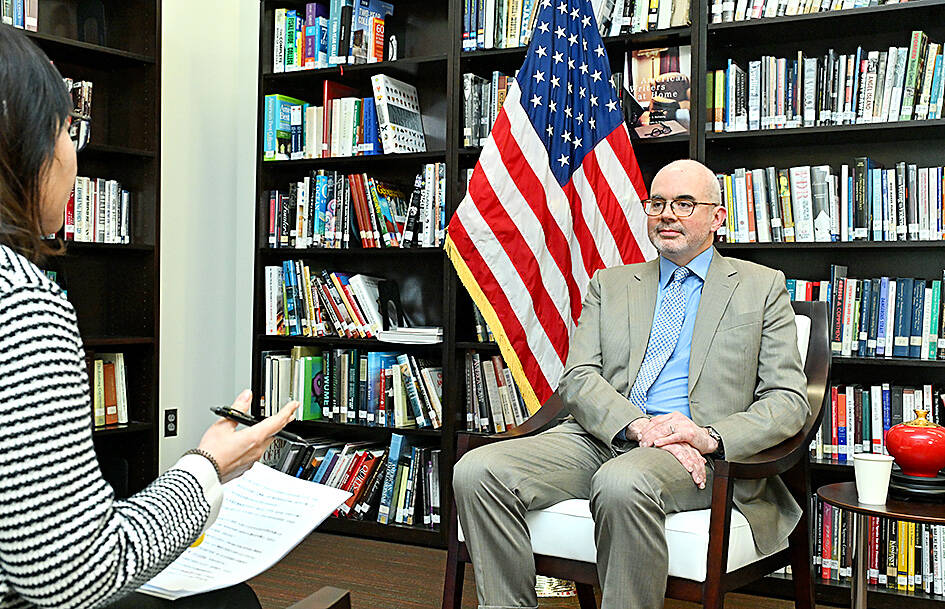The Taiwan-US relationship in the semiconductor sector is not a “zero-sum” game, but a “positive-sum” one, American Institute in Taiwan (AIT) Director Raymond Greene said, adding that the US and Taiwan have an unbreakable partnership.
Greene made the remarks in an exclusive interview with the Liberty Times (sister paper of the Taipei Times) on Friday, which was published in the Chinese-language newspaper yesterday.
Taiwan Semiconductor Manufacturing Co (TSMC) last week announced that it would invest US$100 billion to establish three new chip fabs, two advanced packaging plants and a research and development center in Arizona.

Photo: Cheng I-hwa, AFP
However, the announcement has sparked concerns among some Taiwanese that it could reduce US strategic interest in ensuring security across the Taiwan Strait.
Greene said the move is a positive development not only for Taiwan-US relations, but also for TSMC and its customers, as most of its major customers are in the US.
“I think this business decision will benefit both of our economies,” he said, adding that it also reflects the growing closeness between Taiwan’s and the US’ semiconductor sectors.

Photo: Tien Yu-hua, Taipei Times
TSMC’s decision is also driven by the growing demand for semiconductors, and with the introduction of artificial intelligence (AI) technologies, semiconductor demand is expected to expand indefinitely, Greene said.
While TSMC continues to build new factories across Taiwan, the nation has natural constraints, including limited land, water, workforce and energy resources.
Therefore, much like its investments in Japan and Germany, TSMC sees Arizona as a strategic choice to meet customer demand, given the US’ advanced technology ecosystem, Greene said, adding that Arizona also aligns with TSMC’s goal of expanding its facilities wherever possible.
“I think TSMC chief executive officer C.C. Wei [魏哲家] and President William Lai [賴清德] made some very important points about how this will benefit our development of a closer supply chain relationship,” he said.
“The US and Taiwan relationship in the semiconductor sector isn’t a zero-sum game, but a positive-sum relationship,” he added.
Taiwan would remain home to the world’s most efficient and advanced semiconductor ecosystem, which is why US companies such as Corning and Micron choose to invest and conduct research and development here, he said.
Similarly, the US is home to some of the world’s top chip designers, many of whom collaborate closely with TSMC. It also offers key advantages for production investment, including low-cost energy, a favorable business environment and access to the world’s largest consumer market, he added.
“In the semiconductor sector especially, the US and Taiwan share an unbreakable partnership,” Greene said.
Addressing the rise of the “America skepticism” theory in Taiwan following US President Donald Trump’s return to the White House, the AIT director urged skeptics to take a broader view.
“I would say to people who question to step back and look at what a strong partnership the US and Taiwan has, and how important Taiwan is, not only to the US, but the entire world,” he said.
Quoting US Secretary of State Marco Rubio, Greene said that the US’ commitments to Taiwan have remained consistent across multiple administrations, including during Trump’s first term.
“One of the reasons that it has been so consistent is because it is based on the law — the Taiwan Relations Act, and it also enjoys strong bipartisan support in Congress,” he said.
“But I also think its important to consider just how deep US interest in Taiwan are,” Greene said.
Taiwan is the US’s seventh-largest trading partner, with trade exceeding that of the 1.4 billion people in India and even surpassing trade with G7 nations such as the UK, France and Italy. This highlights the depth and mutual benefits of the US-Taiwan economic relationship, he added.
About 90 percent of US companies plan to maintain or expand their investments in Taiwan, recognizing it as a key partner with the critical technology needed to win the competition of the 21st century, particularly in advanced technology and manufacturing, he said.
“US-Taiwan relations have a very strong basis, not only in terms of values or history, but also in terms of shared interests,” he said.
Green said that one of the Trump administration’s most notable achievements is its swift reaffirmation of key alliances. This included meetings with Japanese Prime Minister Shigeru Ishiba, the trilateral US-Japan-South Korea foreign ministers’ meeting and joint statements emphasizing their commitment to peace and security in the Taiwan Strait
The administration has also stated its opposition to any attempts to change the “status quo” across the Taiwan Strait through force or coercion, he said, adding that the international community’s recognition of Taiwan’s importance is also a stabilizing factor in the cross-strait relations.
Last week, the AIT held a Global Cooperation and Training Framework session on Taiwan’s whole-of-society resilience, which brought representatives from more than 30 countries to Taiwan to talk about how they can enhance collaboration in these critical areas, Greene said.
“I think everyone realizes that if there is any conflict or crisis in the Taiwan Strait, everybody in the world would be impacted. Conservative estimates say that the damage from a cross-strait conflict could cost up to 10 percent of global GDP,” he said.

Taiwan has received more than US$70 million in royalties as of the end of last year from developing the F-16V jet as countries worldwide purchase or upgrade to this popular model, government and military officials said on Saturday. Taiwan funded the development of the F-16V jet and ended up the sole investor as other countries withdrew from the program. Now the F-16V is increasingly popular and countries must pay Taiwan a percentage in royalties when they purchase new F-16V aircraft or upgrade older F-16 models. The next five years are expected to be the peak for these royalties, with Taiwan potentially earning

STAY IN YOUR LANE: As the US and Israel attack Iran, the ministry has warned China not to overstep by including Taiwanese citizens in its evacuation orders The Ministry of Foreign Affairs (MOFA) yesterday rebuked a statement by China’s embassy in Israel that it would evacuate Taiwanese holders of Chinese travel documents from Israel amid the latter’s escalating conflict with Iran. Tensions have risen across the Middle East in the wake of US and Israeli airstrikes on Iran beginning Saturday. China subsequently issued an evacuation notice for its citizens. In a news release, the Chinese embassy in Israel said holders of “Taiwan compatriot permits (台胞證)” issued to Taiwanese nationals by Chinese authorities for travel to China — could register for evacuation to Egypt. In Taipei, the ministry yesterday said Taiwan

Taiwan is awaiting official notification from the US regarding the status of the Agreement on Reciprocal Trade (ART) after the US Supreme Court ruled US President Donald Trump's global tariffs unconstitutional. Speaking to reporters before a legislative hearing today, Premier Cho Jung-tai (卓榮泰) said that Taiwan's negotiation team remains focused on ensuring that the bilateral trade deal remains intact despite the legal challenge to Trump's tariff policy. "The US has pledged to notify its trade partners once the subsequent administrative and legal processes are finalized, and that certainly includes Taiwan," Cho said when asked about opposition parties’ doubts that the ART was

If China chose to invade Taiwan tomorrow, it would only have to sever three undersea fiber-optic cable clusters to cause a data blackout, Jason Hsu (許毓仁), a senior fellow at the Hudson Institute and former Chinese Nationalist Party (KMT) legislator, told a US security panel yesterday. In a Taiwan contingency, cable disruption would be one of the earliest preinvasion actions and the signal that escalation had begun, he said, adding that Taiwan’s current cable repair capabilities are insufficient. The US-China Economic and Security Review Commission (USCC) yesterday held a hearing on US-China Competition Under the Sea, with Hsu speaking on